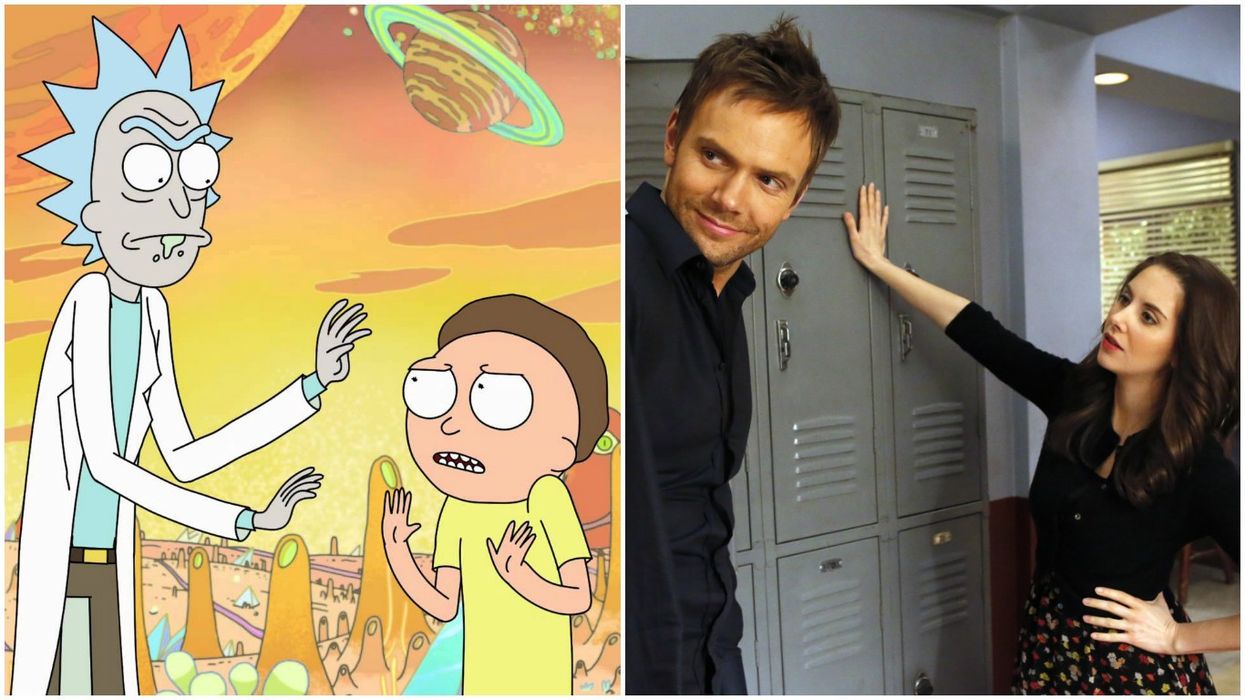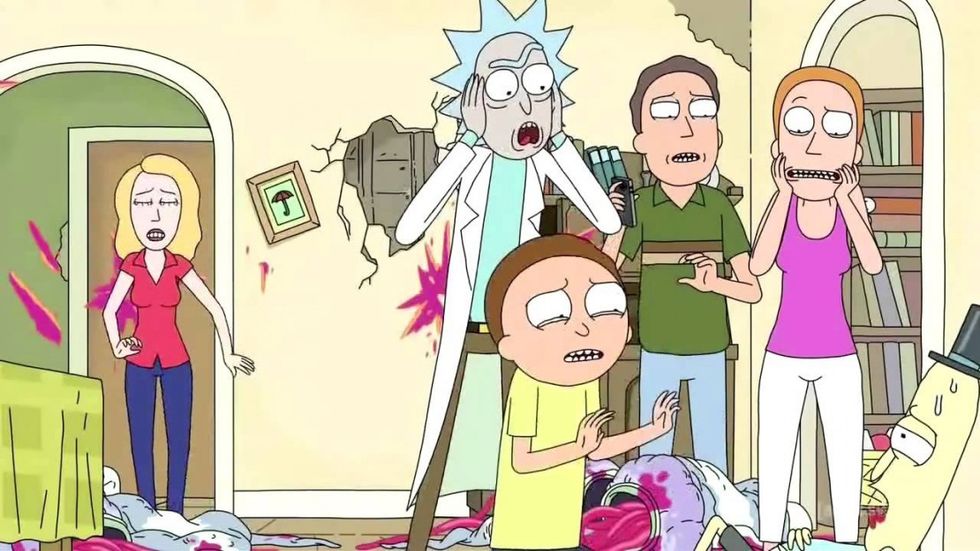7 Screenwriting Truth Bombs from Dan Harmon, Radical Creator of 'Community' and 'Rick and Morty'
Dan Harmon, screenwriter of Community and Rick and Morty, thinks writing for TV is more empowering than writing movies.

When Dan Harmon took to Reddit last Friday, he served up some life wisdom and show business advice in what made for an unforgettable, three-hour-long AMA. Whether it be Rick and Morty or the much-loved but ill-fated Community, Harmon's audience is so enraptured with his projects that they have become almost cult-like followers.
The 2014 documentary Harmontown, which follows the screenwriter across the country on a live podcast tour, depicted Harmon as a somewhat misunderstood genius who is notoriously driven to the edge by his work. This AMA cemented that belief. But part of the reason Harmon's content is so compelling is that he is an incredibly compelling and caring person himself. And one thing's for sure: he's not afraid to say what needs to be said. Below are a few of the highlights.
1. Only write screenplays if you'd do it on a desert island
A 24-year-old screenwriter who was clearly frustrated with his inability to break into the business asked Harmon if self-doubt was normal.
"Yeah, because there's a lot of people jockeying for the job of 'making shit up,'" Harmon responded, "which means there's an overwhelming statistical potential for disappointment in your chosen field."
"One person's boundary is exactly what another person wants to see transgressed. It's all about taste."
For Harmon, however, self-doubt can prove to be a positive influence. "It means you're either going to realize that if you had to, you'd do it for free, or you're going to realize that when push came to shove, you'd be fine doing something else and maybe writing as a hobby," he said. "Nobody can tell you that it's going to work out. Outcome can't be controlled. We're not luck writers; we're screenwriters. So all one screenwriter can say to another is, 'Hey, it's a tough racket for a really long time with random pockets of insanely good fortune to be found.' Would you write screenplays if you were on a desert island? If the answer is yes, you should stick with it, because what the hell else are you going to do that's going to make you happy?"

2. There's no such thing as "going too far"
Anyone who's seen it will tell you that Rick and Morty is one of the most "out-there" shows to have ever found a home on cable television. Harmon and co-creator Justin Roiland aren't afraid of anything when it comes to their bizarre animated sci-fi, and Harmon was keen to endorse this philosophy to the masses.
"There is no line that I know in terms of what's 'too far'," he explained. "A 'boundary' is an artificial construct. We have to create boundaries when they involve other people precisely because it makes empirical something that would otherwise be frustratingly subjective (like that neighbor that just kind of 'feels like' their yard extends into yours, in which case you have to go to City Hall and pull out a map with lines on it). In matters of creativity, when you're sitting and writing dialogue by yourself, there are no [boundaries] needed, because you're not having to function in cooperation. Your job in creation is to scoop everything out of your pumpkin and slop it all onto the table. Seasonal metaphor! Once all the goop is out there, it's your personal taste that will guide you."
"If we all pretended that not only we were famous to everyone around us, but that everyone we saw was also famous, it might help us remap our agoraphobic, competitive, inside-out brains."
"You'll find out what other people's lines are when you start presenting your work," Harmon continued. "What you'll find is that one person's boundary is exactly what another person wants to see transgressed. It's all about taste. I don't observe any objective 'right' or 'wrong' in creativity. If more people felt permission to experiment creatively—to work out their demons, confess their sins, question their governments, betray or make love to their species—well, we wouldn't be in the situation we're currently in. Seasonal metaphor!"

3. It's good to care what people think
One Redditor was quick to praise Harmon for his devil-may-care attitude whilst asking for advice on how to best receive criticism. Harmon instead insisted that the Redditor's perceptions were incorrect.
"It's kind of the opposite," he said. "I only give a shit about what anyone thinks. So much so that I've been through stuff where I had to just face the painful fact that a lot of people aren't going to be predisposed to like me...and that the harder I try to change that, the less likable I become."
Harmon went on to explain that acting like you don't care what people think can be detrimental to your career and artistic process.
"At a certain point," he admitted, "A lot of us say, 'I'm going to not give a shit [what people think].' Then you fail at that because it's fake. You do give a shit. And over time—over an agonizing amount of time, an amount of time so long that perfecting this science will directly precede your death—you find a confusing, paradoxical balancing act, in which you truly don't care because you truly care and you know that the more you care, you the more you can't care."
4. Writing for TV is more empowering than writing movies
When asked if he'd always wanted to be in TV, Harmon admitted that his initial ambitions were in screenwriting for features. He is now known for being somewhat of a control freak, so his reason for the transition isn't very surprising. "TV was an accidental detour from what I thought was going to be a feature writing career," he explained. "It started when Ben Stiller asked me and Schrab during a movie pitch meeting if we had any TV ideas. A very long story later, we ended up doing Heat Vision with Stiller and although FOX didn't pick it up, I had already gotten a taste of how much more empowered writers were in TV than they were in features and ended up sticking around for a few decades."
5. Anyone can practice being famous
Harmon has made a whole host of shows for his fans, who seem to be in a league of their own as far as loyalty is concerned. When one Redditor asked what it means to be the cult leader of his fan kingdom, Harmon was happy to oblige with an answer that's admittedly further out of the box than one would expect.

"On one hand," he began, "achieving notoriety is definitely surreal in that it's nothing like reality. But on the other hand, all it really does is make reality the way reality should be for every single individual. And I've been kind of interested in that concept recently: the idea that what 'fame' really is, on the receiving end, is the feeling that 'everyone' knows who you are and what your value is, which is the feeling everyone would have if we were living in tribal-sized populations that matched what our DNA is 'designed' to experience. If we all pretended that not only we were famous to everyone around us, but that everyone we saw was also famous, it might help us remap our agoraphobic, competitive, inside-out brains."
6. If you're making a studio movie, don't try and beat the studio
A successful studio is one that chooses a method of operation and sticks to it. So even if you're the greatest auteur in the world, you are going to have to match that studio's chosen method.
"Studios are either auteur-oriented or they're team-oriented," Harmon explained. "Both methods generate good and bad movies. I think it probably depends on if you're trying to force an auteur to do the teamwork thing, or if someone on your team secretly considers themselves an auteur. It's lack of being on the same page that probably screws things up the most."
Harmon used Marvel as an example. "I speculate that if one were to take a full-time job on a Marvel project," he said, "one would certainly need to leave 100 percent of their ego at the door and submit fully to the team. Like, beyond what you'd ever think would be enough submission.... they're quite proud of that approach."
7. Create shows that reward obsession
Harmon had an interesting answer for one Redditor who asked why he thought his work had become so popular. As it turns out, Harmon attributes his success on shows like Community and Rick and Morty to the fact that the shows don't punish fans for being obsessive. Harmon creates shows that mirror the shows he likes himself—shows "whose wildest dream is to be studied, loved, analyzed, etc."
Equally as important is that the crew feels as obsessed with the project as the fans do. "I remember Megan Ganz coming to work on Community and she seemed kind of bummed out and told us that her therapist, having listened to all of her frustrations about working on Community, finally said, 'But isn't it just a show?' And the reason Ganz was bummed out by that was because she knew right then and there that she now had to go and find another therapist. Nobody that worked on Community or that works on Rick and Morty has the capacity to regard the show as unimportant—people who feel that way quit—and I think you can feel through the screen."
Source: Reddit











